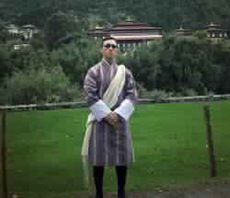For Leonard Buller, M.D., an orthopaedic surgery resident, inspiration last year came not only from inside an operating room but also at an elevation high above sea level, tucked into a monastery in the Himalayan Mountains. There he met with monks who have dedicated their life to prayer, amidst a culture that stresses happiness, kindness, and conser¬vation. It was an education not found in any textbook.
“I’ve learned that life is quite finite,” said Buller, who is the administrative chief resident in orthopaedic surgery at the University of Miami/Jackson Memorial Hospital. “Perhaps our greatest assets are our friends and families and understanding how we can improve the condition of the world.”
Now in his fourth year of a five-year residency, Buller said his education took a decidedly different turn when he volunteered for a month-long assignment in the Kingdom of Bhutan. Working through the Health Volunteers Overseas program, a nonprofit organization based in Washington D.C., Buller traveled to the predominantly Buddhist country in Southeast Asia in early October and returned November 4.
Recently, he delivered a Grands Rounds presentation to share the details of his experience.
“I think it was important to gain perspective on how privileged we are,” said Buller. “Because at the end of our lives, it is not about what we have or don’t have. It is a matter of what we have done, the lives we touched, and who we have impacted.”
Buller worked at the Jigme Dorji Wangchuk National Referral Hospital, a 350-bed facility, Bhutan’s largest, in the capital city of Thimphu. He became a part of the orthopaedic surgical team, attending morning rounds, seeing patients in the clinic, participating in surgeries, and lecturing on topics like fracture care and infection treatment.
“My goal was to deliver as much evidence-based orthopaedic knowledge as possible,” he said.
While impressed by the skill level of his fellow surgeons, most of whom were educated in India or Thailand, Buller found a hospital with limited resources. Patients must bring their own sheets and food, and are discharged with the responsibility of looking after their own medical chart.
Buller says it is not an easy proposition for a country that is one of the poorest in the world, with an average annual income of just $700.
“It’s very difficult, because if the patients aren’t lucky enough to have a car, sometimes they are walking for days on dirt roads or riding on mules, yaks or horses,” said Buller.
As part of his visit, Buller put together a hospital-wide presentation on the need for prevention of deep vein thrombosis (DVT) in orthopaedic patients at the hospital. After his presentation, the hospital’s administration decided to make DVT prophylaxis a standard part of care.
“We are exceptionally proud that Dr. Buller had the opportunity to showcase his medical and surgical experience in Bhutan,” said Frank J. Eismont, M.D., Leonard M. Miller Professor and Chair of the Department of Orthopaedics, the George and Marla Bergmann Endowed Chair in Orthopaedics, Chief of the Orthopaedic Spine Service and Director of the Spine Fellowship Program. “We teach all of our residents to be the best possible advocates for their patients, and it is clear Dr. Buller was able to make a difference in Bhutan.”
Every Sunday, one of the technicians from the team would lead Buller on long treks to different temples and monasteries in the Himalayas, where he would visit with the monks. On one occasion, he had the opportunity to provide care to one of the monks experiencing high blood pressure.
Buller learned of the opportunity to do the international rotation last year and asked for permission to take part as part of his fourth year research/elective rotation. Sheila Conway, M.D., the Director of the Orthopaedic Surgery Residency Program, said Buller’s exceptional work ethic and leadership skills made him an ideal choice for the experience.
“In addition to Dr. Buller’s research endeavors, he has a vigorous and genuine history of community service,” said Conway, who is also associate professor of clinical orthopaedics, Program Director of Musculoskleletal Oncology Fellowship Program and Surgical Director of University of Miami Hospital. “He sought out a residency program that prioritizes service and diversity. Dr. Buller is a champion for the uninsured and underinsured patients on a daily basis.”
Buller says since his return from Bhutan, he’s had more confidence in his skills, as well as a renewed approach to addressing the needs of “the whole patient.”
He will be applying soon for a fellowship but recommends other residents experience the same sort of volunteer work to gain cultural insight and learn more about themselves.
“I don’t know if it is for everyone,” Buller said. “You have to be willing to get out of your comfort zone, be open to experiencing something different, and learn what you can offer patients and what you can work on to become the best surgeon you can possibly be.”



 Book an Appointment
Book an Appointment


